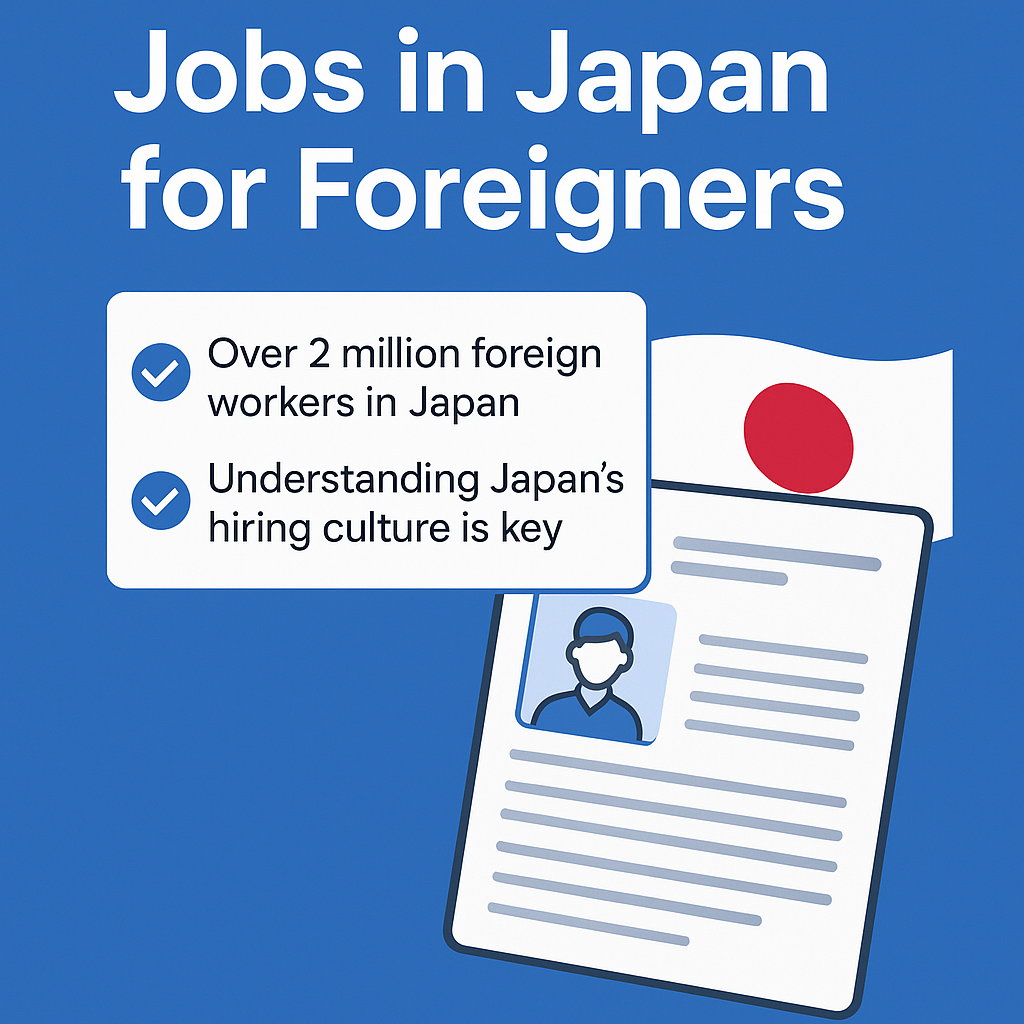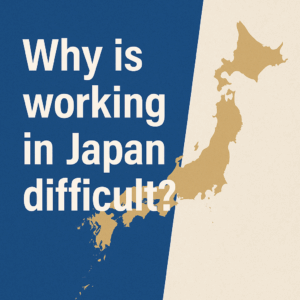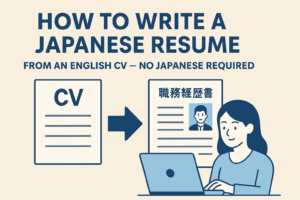Thinking about working in Japan? Good news ― job opportunities for foreigners have never been better. This guide covers everything you need to know to start your job search in Japan, step by step.
Resume Conversion Kit
Introduction: Japan’s Job Market Is Changing — Fast
If you’re looking for a job in Japan as a foreigner, you’re not alone. Japan’s job market is changing rapidly.
A record number of foreign professionals are entering Japan’s workforce — and the demand has never been higher.
This isn’t just a trend.
Japan faces a long-term labor shortage due to a declining population and aging society. To stay competitive, Japanese companies are increasingly hiring foreign talent, not only for manual jobs but also for skilled white-collar positions.
→ Now is the best time to look for jobs in Japan.
Why Are Job Opportunities in Japan Increasing for Foreigners?
- Japan’s total foreign worker population hit 2.3 million in 2024, an increase of more than 500,000 in just 3 years.
- The number of foreign workers holding professional and technical visas — typically covering white-collar roles like engineers, marketers, HR, and IT specialists — exceeded 720,000 as of 2024, growing by more than 20% year over year. (Source: Ministry of Health, Labour and Welfare, Japan, 2024)
What’s Driving the Demand for Foreign Workers in Japan
- Japan’s working-age population is shrinking rapidly.
- Japanese companies can’t fill all open positions with local candidates.
- International companies in Japan — and increasingly Japanese companies — are opening doors to foreign talent.
✔️ This is a structural change, not a temporary trend.
Key Industries Hiring Foreign Professionals in Japan
This article focuses on white-collar jobs, not manual labor or jobs under the “Technical Intern” or “Specified Skilled Worker” programs.
High-demand sectors for foreign professionals include:
- Information Technology (Software Engineers, Data Scientists, IT Consultants)
- Marketing and Sales (especially in international businesses)
- HR, Talent Acquisition (bilingual recruiters are in demand)
- Education (especially English teachers and international school roles)
- Finance, Consulting, and Legal Services
- Healthcare and Research (specialized roles)
These jobs typically require:
- A university degree
- Relevant skills or experience
- Business-level English (and sometimes Japanese)
Visa Types for White-Collar Jobs in Japan
If you’re aiming for a professional job in Japan, the most common visas include:
- Engineer / Specialist in Humanities / International Services
- Intra-company Transferee
- Professor / Researcher / Instructor
- Highly Skilled Professional Visa
✔️ They are designed for career-track jobs like engineering, business, finance, marketing, education, and consulting.
Key Cultural Differences in the Japanese Hiring Process
If you’ve applied for jobs in Western countries, you may notice that while the overall application process looks familiar — submit your resume, go through interviews, and wait for an offer — the expectations, evaluation criteria, and communication style in Japan are quite unique.
Here are the key cultural differences you need to understand:
- Japanese resumes (Rirekisho) and career summaries (Shokumukeirekisho) are not just documents — they are formal business tools. Both are written in very specific formats, using polite, standardized language. Unlike Western CVs, which emphasize individuality and achievements, Japanese resumes focus on clear, neutral descriptions of your background and experience.
- The quality of your written application is critically important. In Japan, first impressions often happen on paper, not in person. If your documents are poorly structured, incorrectly formatted, or missing certain sections, your application might be rejected before you ever get an interview — regardless of your skills.
- Formality in communication is non-negotiable. This applies to every step: emails, phone calls, and interviews. The tone is polite, humble, and indirect. Even a simple mistake in how you greet someone in an email can create a negative impression.
- Conservative hiring practices are common.Many Japanese companies value long-term stability, professionalism, and your ability to fit into their organizational culture. Aggressive self-promotion, which is often expected in Western interviews, can sometimes be seen as rude or arrogant in Japan.
✔️ Understanding and adapting to Japanese hiring culture isn’t optional — it’s essential.
This is the point where many highly skilled foreign applicants struggle — not because of their abilities, but because they didn’t know how different the expectations are.
Helpful Resources to Get Started
- Japanese Resume Format: What Recruiters in Japan Really Want — Understand the difference
- How to write a Japanese resume (Shokumukeirekisho) — Step-by-step guide
- How to convert your English CV into a Japanese-style resume — Detailed guide
These resources will help you navigate Japan’s unique job application process with confidence.
Conclusion: Now Is the Best Time to Find Jobs in Japan
✔️ Japan’s job market is opening up for foreign professionals more than ever before.
✔️ But — understanding the Japanese hiring process is crucial to success.
If you invest time in learning how to write a proper Japanese resume, understand the culture of job hunting here, and apply to the right industries, you’ll have a real competitive edge in Japan’s job market.
🚀 The opportunity is real — and the time is now.
References / Data Sources
Ministry of Health, Labour and Welfare (Japan) – Foreign Workers in Japan – 2024 Report
Reuters – Japan Faces Shortage of Almost 6 Million Workers by 2040
Read this next








